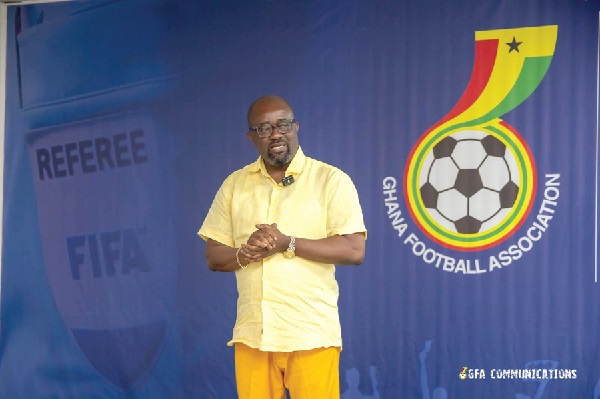Hooliganism has long plagued Ghanaian football, but the recent escalation of violence has pushed the issue to a breaking point.
A dark cloud now hangs over the game after the tragic death of Asante Kotoko supporter Yaw Frimpong, popularly known as ‘Pooley,’ during violent clashes at the Nana Koronamansah Park, near Nsoatre, last week.
Recognising the severity of the problem, the Ghana Football Association (GFA), Premier League clubs, and security forces have joined forces to implement a 33-point action plan aimed at curbing hooliganism.
This includes tougher policing, intelligence-led security measures, and stringent punishments for perpetrators of stadium violence.
The raft of security reforms spearheaded by the Inspector General of Police, Dr George Akuffo Dampare, includes the appointment of Sports Security Officers in all 16 regions, the creation of a specialised Sports Policing Unit, and the integration of sports security training into police recruitment programmes.
Undercover intelligence operatives will also be deployed within supporter groups to identify potential threats, while a nationwide fan education campaign will promote discipline and sportsmanship.
Ghana’s police chief has made it clear: "We are committed to fixing this problem. We will get it done because it is our responsibility to protect the people of Ghana and the very fabric that unites us."
Significantly, Asante Kotoko and Hearts of Oak, Ghana’s two biggest clubs, have set aside their historic rivalry to push for major reforms. Their joint position paper calls for immediate changes to matchday security.
Business and financial fallout
Beyond the human cost, the rise in violence has far-reaching economic consequences for Ghanaian football. The Ghana Premier League is already in financial turmoil.
StarTimes, the league’s official broadcaster, ended its partnership with the GFA this season, depriving clubs of much-needed revenue. Meanwhile, betPawa’s abrupt termination of its title sponsorship has left the league struggling to secure new investment.
Now, with Asante Kotoko—one of the league’s biggest brands—announcing their withdrawal from the competition in the wake of Pooley’s death, the situation has worsened.
Kotoko’s absence not only weakens the competitive appeal of the league but also threatens to derail sponsorship negotiations and broadcasting deals. Without one of its flagship clubs, the league risks losing even more credibility and financial backing.
Sponsors and corporate investors are increasingly wary of associating their brands with a league marred by violence.
No company wants to invest in a product that is seen as unsafe and controversial. As a result, clubs are struggling to secure partnerships, leading to reduced revenue streams, lower wages for players, and a further exodus of talent to foreign leagues.
Image crisis
Ghanaian football’s image is at an all-time low, and this is not just a Premier League problem. Violence has also crept into the Division One League and, alarmingly, the Women’s Premier League.
The spread of hooliganism into women’s football is particularly troubling, as it threatens to undermine efforts to grow the women’s game and attract investment.
Fans too are turning away from local football. The deteriorating matchday experience, driven by fear of violence, has resulted in dwindling stadium attendance.
Families and casual spectators prefer to watch foreign leagues on television, where top-quality football is guaranteed in a safe environment.
This decline in matchday revenue further weakens clubs' financial sustainability and reduces the league's overall appeal.
If these problems are not addressed, the Ghana Premier League risks becoming irrelevant. Without fans, sponsors and investment, domestic football could collapse entirely, making it even harder for Ghana to compete on the continental stage.
Best practices and solutions
Urgent reforms must be implemented to restore trust in the Ghana Premier League. Stadium security must be prioritised, with enhanced surveillance systems, well-trained security personnel, and stricter entry checks.
Implementing a ticketing system linked to national IDs could help identify and ban repeat offenders, creating a safer matchday environment.
Ghanaian clubs and the GFA should also invest in better fan engagement strategies. Establishing Supporter Liaison Officers (stewards) to mediate between fans and management could help resolve grievances before they escalate into violence.
Furthermore, education campaigns must be intensified to instil a culture of respect and discipline among supporters.
Another key strategy is improving medical response at match venues. Many deaths and serious injuries in Ghanaian football have been exacerbated by the lack of proper emergency care at stadiums. Every match venue should have well-equipped ambulances, trained paramedics, and clear evacuation procedures in cases of emergency.
Equally important is corporate engagement. The GFA and clubs must actively reach out to businesses, demonstrating that steps are being taken to curb violence and improve the overall professionalism of the league.
If sponsors see real commitment to change, they may be more willing to invest, helping to stabilise the financial foundation of Ghanaian football.

